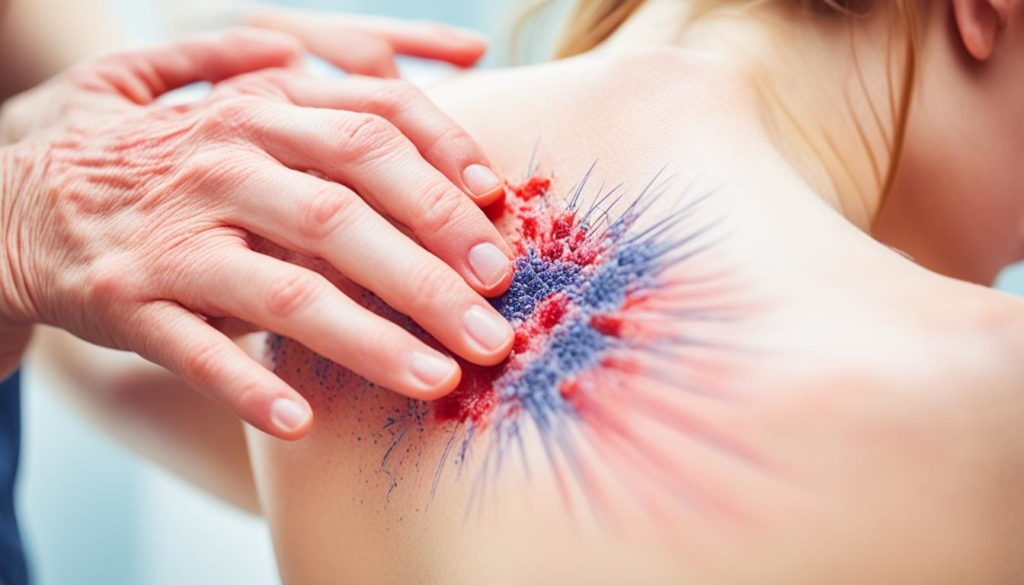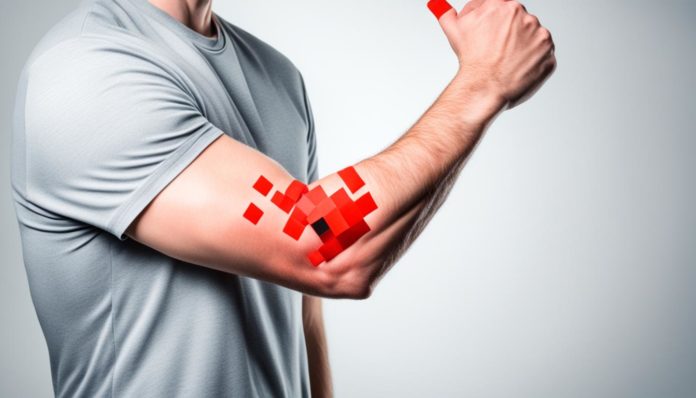Did you know that over 90% of people will deal with itching at some point? This fact shows how common the issue is. But, many don’t know why itching happens. Learning about itching’s causes is key to keeping your skin healthy and dealing with discomfort. We will look into pruritus, which means itching, and discuss what leads to it.
Key Takeaways
- Itching, also known as pruritus, affects a vast majority of individuals at some point.
- Identifying the causes of itching can significantly improve skin health and quality of life.
- Common causes of itching range from allergic reactions to chronic skin conditions and environmental factors.
- It’s essential to recognize the symptoms and seek appropriate treatments to manage and alleviate itching.
- This guide will provide detailed insights into pruritus causes, symptoms, and management strategies.
Understanding Itchy Skin: An Overview
Itchy skin, medically known as pruritus, makes you want to scratch. Pruritus is a symptom, not a disease, and comes from various causes. These include skin conditions and systemic diseases.

What is Pruritus?
Pruritus is another word for itching. Many factors can cause this uncomfortable feeling. It might affect just one area or the whole body.
Knowing about pruritus is key to finding out why it’s happening and how to treat it.
Common Symptoms of Itchy Skin
Common symptoms of itchy skin include:
- Redness and inflammation, which may point to an allergy or irritation.
- Bumps or spots, often from eczema or hives.
- Blisters or scaly patches, seen with skin problems like psoriasis.
- Dry, cracked skin, which can come from the environment or health issues.
It’s important to notice these symptoms to figure out what causes the itch and get the right help.
Causes of Itching: An In-depth Look
Understanding why we itch involves looking at many factors. These include easy-to-fix issues like dry skin and complex internal health problems. Let’s explore these causes to better understand the itch.
- Dry Skin
Dry skin feels flaky and rough and can make you itch. Things like cold weather and less moisture in the air can make it worse.
- Allergic Reactions
When your body reacts to allergies, you may start to itch. Things like pet dander, pollen, and certain fabrics are common triggers.
- Skin Conditions
Eczema, psoriasis, and dermatitis are skin problems that can cause a lot of itching and discomfort.
- Infections
Skin infections from bacteria, viruses, or fungi can break down your skin’s defense, causing redness and itch.
- Systemic Diseases
Diseases like liver problems, kidney failure, and some cancers can make your skin itch. This happens because these diseases change how your body works, affecting your skin.

| Reason | Description | Examples |
|---|---|---|
| Dry Skin | Loss of moisture in outer layers | Cold weather, low humidity |
| Allergic Reactions | Immune response to allergens | Pet dander, pollen, fabrics |
| Skin Conditions | Chronic dermatological issues | Eczema, psoriasis, dermatitis |
| Infections | Pathogen-induced irritation | Bacterial, viral, fungal |
| Systemic Diseases | Internal disease causing symptoms | Liver disease, kidney failure |
Looking into these different causes helps us understand why we itch. Knowing and managing these factors is key to keeping our skin healthy and itch-free.
Allergic Reactions and Their Role in Itching
Allergic reactions often cause itching. This is due to the body’s reaction to different allergens. It’s important to know about these allergens and how they affect the skin.
Types of Allergens
There are many allergens that can make you itch. They include:
- Pollen
- Dust mites
- Certain foods
- Animal dander
- Insect stings
How Allergies Cause Itching
When you meet an allergen, your body fights back. This can make chemicals like histamines. They lead to itching and other signs. How bad these signs are varies with each person’s allergies and how sensitive they are.
Managing Allergy-Induced Itching
To handle itching from allergies, you can:
- Stay away from allergens by keeping your place clean and changing what you eat.
- Take antihistamines to lessen allergic reactions and ease itching.
- Use creams like corticosteroids to calm the skin and lower swelling.
Knowing how allergens affect you is key. It helps you tackle itching effectively and keep your skin healthy.
Skin Conditions That Lead to Itching
Several skin disorders are known to cause ongoing itching. Knowing about these can help you deal better with symptoms. This knowledge also improves your skin’s health.
Eczema and Dermatitis
Eczema, also called atopic dermatitis, features inflamed, itchy skin. The itch from eczema can get really bad. This happens due to allergens or harsh soaps. To manage it, use a good skin care routine. This includes keeping your skin moisturized and avoiding triggers.
Psoriasis
Psoriasis causes itching, too. It’s an autoimmune issue that makes skin cells turn over too fast. This creates red, scaly, itchy patches. To keep your skin healthy, use creams, light therapy, or medications. These treatments help reduce inflammation and itching.
Fungal Infections
Fungal infections like ringworm cause a lot of itching. They love warm, damp places and can be very annoying. Use antifungal creams and stay clean to avoid these infections.
| Skin Condition | Main Symptoms | Treatment Options |
|---|---|---|
| Eczema and Dermatitis | Inflamed, red, and itchy skin | Moisturizers, corticosteroids, avoiding triggers |
| Psoriasis | Red, scaly patches, itching | Topicals, phototherapy, systemic medications |
| Fungal Infections | Itchy, red, ring-shaped rashes | Antifungal creams, hygiene practices |
Environmental Factors and Itching Triggers
It’s important to recognize what in our environment makes us itch. Things we see every day may not seem harmful but can affect our skin. This discussion aims to identify itching triggers and how to lessen their effect.
Temperature swings are a big deal. Temperature extremes, like intense heat and cold, dry the skin which causes irritation. Heat makes you sweat, and with tight clothes, itchiness often follows.
Humidity levels also play a role. Dry air from low humidity takes moisture away from the skin, boosting itchiness. On the flip side, high humidity can make you sweat more and clog pores, triggering itchiness too.
Environmental irritants need attention as well. We find irritants in air pollution, cleaning agents, and some fabrics. They can directly irritate the skin or cause allergic reactions. Knowing what’s around you helps avoid these triggers.
- Soaps and Detergents
- Fabric Softeners
- Perfumes
- Pollen
- Animal Dander
Being alert to these itch factors can vastly improve skin health. Do simple things like control your home’s humidity, choose gentler cleaners, and opt for breathable clothes. These steps can reduce triggers and promote itch-free skin.
| Environmental Factor | Potential Impact | Mitigation Strategies |
|---|---|---|
| Heat | Dry skin, sweating. | Stay cool, use fans/AC. |
| Cold | Dry skin, cracked skin. | Moisturize frequently, wear layers. |
| Low Humidity | Dry air, itchy skin. | Use humidifiers, moisturize. |
| High Humidity | Sweating, blocked pores. | Stay dry, wear loose clothing. |
| Environmental Irritants | Allergies, direct irritation. | Avoid known irritants, use hypoallergenic products. |
Medications and Their Side Effects on Skin Health
Medications help treat many health issues, but they can also cause side effects like skin itching. It’s important to know which drugs can make your skin itch. Knowing how to deal with these side effects can make your skin healthier.
Common Medications Causing Itching
Some drugs are known to make your skin itch. Here are a few types:
- Antibiotics: Drugs like penicillin and sulfa can cause allergic reactions, resulting in itching and rashes.
- Opioids: Painkillers like morphine and codeine may make your body release histamine, causing itching.
- Antifungal Medications: Drugs for fungal infections, like ketoconazole and terbinafine, can irritate your skin and make it itch.
- Anti-malarial Drugs: Treatments for malaria, such as chloroquine and hydroxychloroquine, can cause pruritus.
Managing Itching Due to Medications
If your medication makes you itch, you can do a few things about it:
- Consult Your Physician: Talk to your doctor about any side effects you’re having. They might change your dose or offer a different treatment.
- Topical Creams and Lotions: Anti-itch creams and lotions you can buy without a prescription can calm your skin.
- Antihistamines: If you’re itching because you’re allergic to something, antihistamines like diphenhydramine might help.
- Cold Compresses: Putting a cold, wet cloth on the itchy area can lessen swelling and temporarily ease the itch.
Knowing how itching and medication are connected is key to staying comfortable and keeping your skin healthy. Always talk to health experts if your itch doesn’t go away. It might be a sign of something more serious.
Systemic Conditions Linked to Itchy Skin
Itchy skin might signal deeper health problems. Issues like liver disease, kidney disease, and thyroid imbalances often cause itching. Recognizing these can guide proper treatment and ease discomfort.
Liver Disease and Itching
Liver disease is a key cause of itching. If the liver struggles, bile salts build up in the skin and cause itching. Treating the underlying issue or using specific medications can help.
Kidney Disease and Skin Health
Those with kidney problems may also experience itching. This happens when toxins accumulate in the blood due to poor kidney function. Treatments like dialysis can reduce itching from kidney issues.
Thyroid Conditions
Thyroid hormone imbalances can make your skin itch too. Both too much and too little thyroid hormone affect your skin’s moisture levels. Getting the right medication can fix your skin’s health and stop the itching.
| Condition | Cause of Itching | Management Strategies |
|---|---|---|
| Liver Disease | Bile salt accumulation | Medications, improving liver function |
| Kidney Disease | Toxin buildup | Dialysis, targeted treatments |
| Thyroid Conditions | Imbalance in skin moisture | Appropriate medications |
Psychological Factors and Itching
Itching isn’t just physical. Many psychological factors can affect it too. These include stress and anxiety, which can make itching worse. Understanding how our minds and bodies work together helps us manage itching better.
Stress and Anxiety
When stressed, our bodies release hormones like cortisol. This can harm our skin and make us itch more. Our emotional state can make itching feel worse, creating a tough cycle of stress and itchiness.
Studies show a strong connection between our psychological state and itching. A report from the National Center for Biotechnology Information explains how stress affects our skin’s barrier. This makes our skin prone to irritants and itching.
Psychogenic Itch
Sometimes itching has no clear physical cause. This is known as psychogenic itch. It shows how much our psychology affects what we feel. For those with this issue, usual skin treatments don’t work because the root problem is psychological.
To manage psychogenic itch, addressing the psychological cause is key. Treatments like cognitive-behavioral therapy (CBT), stress management, and sometimes medications help. By focusing on both mind and body, patients can overcome the relentless itch.
Realizing how psychological factors and itching are linked offers new treatment paths.
This can greatly improve life for those dealing with stress-related and psychological itching.
| Factor | Effect on Itching | Management |
|---|---|---|
| Stress | Exacerbates itch through cortisol release | Stress management and relaxation techniques |
| Anxiety | Enhances perception of itch | Cognitive-behavioral therapy |
| Psychogenic Itch | Itching without a physical cause | Combining psychotherapy and medications |
When to Seek Medical Advice for Itching
If itching lasts more than two weeks, it’s time to see a doctor. This kind of lasting itch could mean there’s a deeper health issue needing attention.
Signs Indicating a Serious Condition
Itching might seem small, but with signs like intense itching, redness, and swelling, it’s serious. These symptoms, especially if they disrupt your life, could mean a serious problem. Conditions like eczema, diseases, or nerve issues might be the cause of ongoing itch.
Diagnostic Procedures
Figuring out the reason for itching is a must. Doctors will review your medical history and run tests. They might do blood work and check how your liver and kidneys are working.
According to Mayo Clinic, finding the root cause helps doctors create a good treatment plan.
Treatment Options
Dealing with severe itching needs a broad approach. Treatment could be creams, pills, or changes in how you live.
For issues like eczema or psoriasis, there are specific ways to help. Treating the main disease often helps reduce the itch. Also, lotions, not scratching, and drinking water help comfort you.
Conclusion
This guide took a deep dive into the world of itching. We looked at many causes and what they mean. From common allergens to bigger health issues, we showed why knowing what triggers itch is key. To manage it well, understanding and action are both crucial.
We talked about skin irritation and the many things that cause it. Every part of this article highlighted how to deal with skin problems like eczema and psoriasis. Stress, medicines, and the need for doctor’s help if things don’t get better were also covered.
In our final thoughts, we pushed for a well-rounded way to handle itchy skin. This includes being proactive, making changes in daily life, and seeking expert advice. With this knowledge, people can fight off itchy skin better. They’ll be more comfy and happy. In short, knowing and tackling the many reasons for itching can majorly boost skin health and life joy.
FAQ
What is Pruritus?
Pruritus is the medical name for itching. It’s when you feel like scratching your skin. This can be due to many reasons or contact with certain things.
What are common symptoms of itchy skin?
Itchy skin symptoms include redness, bumps, spots, or blisters. Dry, cracked skin is also common. The specific symptoms can differ based on what causes the itch.
What are some reasons for itching?
Itching happens for different reasons. These include dry skin, reactions to allergies, skin diseases like eczema, infections, exposure to irritants, diseases affecting body organs, or side effects of some medicines.
How do allergic reactions cause itching?
Things like pollen and certain foods can make your body release histamines. This causes skin swelling and itching.
What are some strategies for managing allergy-induced itching?
To manage it, avoid allergens when possible. Also, using medicines like antihistamines helps. Keeping your living spaces clean to reduce allergen exposure is another strategy.
How do skin conditions like eczema and psoriasis lead to itching?
Eczema and psoriasis make your skin inflamed and disrupt its protective layer. This leads to red, swollen skin that itches a lot.
What are common environmental factors that trigger itching?
Things like extreme hot or cold, humidity, and contact with harsh chemicals or fabrics can make itching worse.
Which medications can cause itching as a side effect?
Some medicines, including antibiotics and pain relievers, might make you itch. If you think a medicine makes you itch, talk to a doctor about other options.
How do systemic conditions like liver or kidney diseases affect skin health?
Diseases of organs like the liver or kidneys can build up toxins in your body, causing itches. These illnesses interrupt regular body processes, leading to skin issues.
Can psychological factors like stress lead to itching?
Yes, stress and anxiety can either cause or make itching worse. Some itches start mainly because of psychological reasons.
When should one seek medical advice for itching?
Seek medical help if your itching is really bad, doesn’t stop, or comes with symptoms like losing weight, fever, or sweating at night. These could be signs of a more serious health issue.


